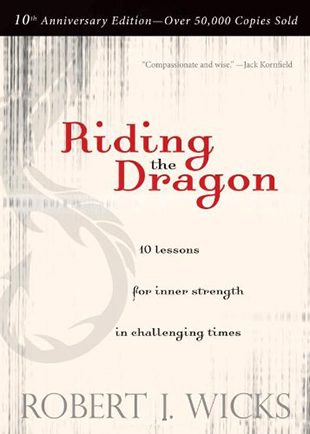In Paolo Coelho's fable The Alchemist, a camel driver says, "Once you get to the desert, there's no going back. And when you can't go back. You have to worry about going forward. The rest is up to Allah, including the danger." Psychologist Robert Wicks, the author of more than 12 books on spirituality and personal growth including Everyday Simplicity uses this as an illustration of making the most out of periods of spiritual darkness.
The title of the book comes from an observation by David Brazier who characterizes Western therapy as an attempt to keep the dragon in its cave or slay it whereas Zen masters advise students to learn to ride the dragon. Wicks is a specialist in the field of secondary stress and counsels people who help others — psychologists, doctors, nurses, and ministers. He is convinced that caretakers must learn to find meaning in the midst of troubles, confusion, and things going against us. He quotes Margaret Mitchell who said: "Every problem has two handles. You can grab it by the handle of fear or the handle of hope."
In chapters on pruning carefully, recognizing your renewal zones, catching the slide, seeking hidden possibilities, engaging the darkness, pairing clarity and kindness, finding love in small deeds, seeking perspective daily, building a barrier of simplicity, and coming home more often, Wicks encourages us to see problems, hindrances, and spiritual darkness as a reset button. Many of the teachers quoted in this book are Buddhist, including Pema Chodron and Jack Kornfield. Wicks has written a nurturing work that provides plenty of self-care tips for professionals who serve others in their work.
